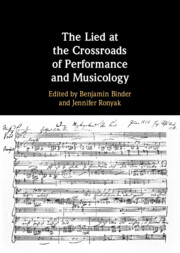Book contents
- The Lied at the Crossroads of Performance and Musicology
- The Lied at the Crossroads of Performance and Musicology
- Copyright page
- Dedication
- Contents
- Figures
- Tables
- Music Examples
- Contributors
- Foreword
- Acknowledgments
- Introduction
- 1 In Search of Song
- 2 Max Heinrich, “Wizard of Song”
- 3 Fragmenting Frauenliebe und -leben
- 4 Robert Schumann’s “Ich grolle nicht”
- 5 Schubert’s Mignon and Reimann’s Mignon
- 6 Locating the Wanderer’s Solitude in Choral and Nonsolo Performances of Winterreise
- 7 Analysis, Performance, and the Deep Nineteenth Century
- 8 Crossing Boundaries
- 9 Singers Speak about Musicology and Performance
- Bibliography
- Index
3 - Fragmenting Frauenliebe und -leben
Reading and Performing Alternative Lives and Loves
Published online by Cambridge University Press: 09 February 2024
- The Lied at the Crossroads of Performance and Musicology
- The Lied at the Crossroads of Performance and Musicology
- Copyright page
- Dedication
- Contents
- Figures
- Tables
- Music Examples
- Contributors
- Foreword
- Acknowledgments
- Introduction
- 1 In Search of Song
- 2 Max Heinrich, “Wizard of Song”
- 3 Fragmenting Frauenliebe und -leben
- 4 Robert Schumann’s “Ich grolle nicht”
- 5 Schubert’s Mignon and Reimann’s Mignon
- 6 Locating the Wanderer’s Solitude in Choral and Nonsolo Performances of Winterreise
- 7 Analysis, Performance, and the Deep Nineteenth Century
- 8 Crossing Boundaries
- 9 Singers Speak about Musicology and Performance
- Bibliography
- Index
Summary
The perennially popular song cycle Frauenliebe und -leben, Op. 42, composed by Robert Schumann to poems by Adelbert von Chamisso in 1840, continues to provoke controversy arising from its presentation of women’s attitudes to love and life. This essay offers two fresh explorations of its context, drawing on the historical model of Susan Youens’s work alongside the ethically-driven epistemology of Gayatri Spivak. First, an examination of overlooked literature contemporary with Chamisso’s writings, as well as later in the century, challenges the assumption that he accurately represented the views of German Biedermeier women in the 1830s, or indeed in the 1860s when the cycle gradually attained popularity in public performance. Second, a survey of the early performance history of the cycle reveals a fragmented approach to the work on the concert stage, especially by Clara Schumann and her contemporaries. These women regularly performed the cycle only in parts, and/or in combination with other works, an approach which, I argue, mitigates its expressive limitations and enriches its undeniable lyrical value. I conclude by examining some contemporary performance approaches. Taken together, these explorations may lead to a fresh understanding and approach to performing the work today.
Keywords
- Type
- Chapter
- Information
- The Lied at the Crossroads of Performance and Musicology , pp. 55 - 77Publisher: Cambridge University PressPrint publication year: 2024



